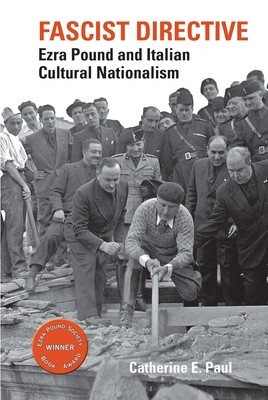
- We will send in 10–14 business days.
- Author: Catherine E Paul
- Publisher: Clemson University Press
- Year: 2016
- ISBN-10: 1942954050
- ISBN-13: 9781942954057
- Format: 15 x 23.1 x 2.5 cm, kieti viršeliai
- Language: English
- SAVE -10% with code: EXTRA
Reviews
Description
A Winner of the 2016 Ezra Pound Society Book Award.
In 1938, American poet Ezra Pound published Guide to Kulchur, a book so radically different from his earlier writing that readers might not have believed that it was written by the same firebrand aesthetician who had advocated in 1913 that poets go in fear of abstractions. But Guide to Kulchur was only the latest example of a new kind of prose that Pound had been writing-fiercely invested in politics and the mobilization of cultural heritage to its service. Pound's new modernism came as a direct effect of his investment in fascism. Since the last monographic treatment of Pound's fascism, scholars of literature, history, art history, urban design, and music have uncovered important aspects of the fascist regime's use of culture to foment Italian national identity. These studies reveal the cultural, mythical, rhetorical, and intellectual aspects of that regime-more than enough new knowledge to require a reappraisal of perhaps the most famous, certainly the most notorious, American inItaly in that era, and perhaps the entire twentieth century. Unlike previous discussions of Pound's adoption of Italian fascism, which focus mostly on his political and economic interests, this book reveals the importance of the cultural projects of Mussolini's fascist regime. By bringing Italian primary sources and new approaches to the cultural project of Mussolini's regime to bear on Pound's prose work (including unpublished material from the Pound Papers and untranslated periodical contributions), Paul shows how Pound's modernism changed as a result of involvement in Italian politics and culture. At the same time, it uses the familiar figure of Pound to provide an entry for scholars of Anglo-American modernism into the diverse and complex realm of Italian modernism.
EXTRA 10 % discount with code: EXTRA
The promotion ends in 22d.08:04:32
The discount code is valid when purchasing from 10 €. Discounts do not stack.
- Author: Catherine E Paul
- Publisher: Clemson University Press
- Year: 2016
- ISBN-10: 1942954050
- ISBN-13: 9781942954057
- Format: 15 x 23.1 x 2.5 cm, kieti viršeliai
- Language: English English
A Winner of the 2016 Ezra Pound Society Book Award.
In 1938, American poet Ezra Pound published Guide to Kulchur, a book so radically different from his earlier writing that readers might not have believed that it was written by the same firebrand aesthetician who had advocated in 1913 that poets go in fear of abstractions. But Guide to Kulchur was only the latest example of a new kind of prose that Pound had been writing-fiercely invested in politics and the mobilization of cultural heritage to its service. Pound's new modernism came as a direct effect of his investment in fascism. Since the last monographic treatment of Pound's fascism, scholars of literature, history, art history, urban design, and music have uncovered important aspects of the fascist regime's use of culture to foment Italian national identity. These studies reveal the cultural, mythical, rhetorical, and intellectual aspects of that regime-more than enough new knowledge to require a reappraisal of perhaps the most famous, certainly the most notorious, American inItaly in that era, and perhaps the entire twentieth century. Unlike previous discussions of Pound's adoption of Italian fascism, which focus mostly on his political and economic interests, this book reveals the importance of the cultural projects of Mussolini's fascist regime. By bringing Italian primary sources and new approaches to the cultural project of Mussolini's regime to bear on Pound's prose work (including unpublished material from the Pound Papers and untranslated periodical contributions), Paul shows how Pound's modernism changed as a result of involvement in Italian politics and culture. At the same time, it uses the familiar figure of Pound to provide an entry for scholars of Anglo-American modernism into the diverse and complex realm of Italian modernism.


Reviews